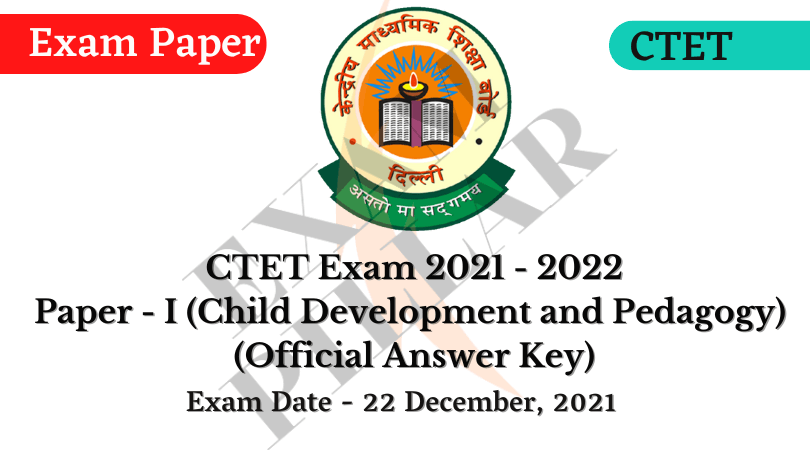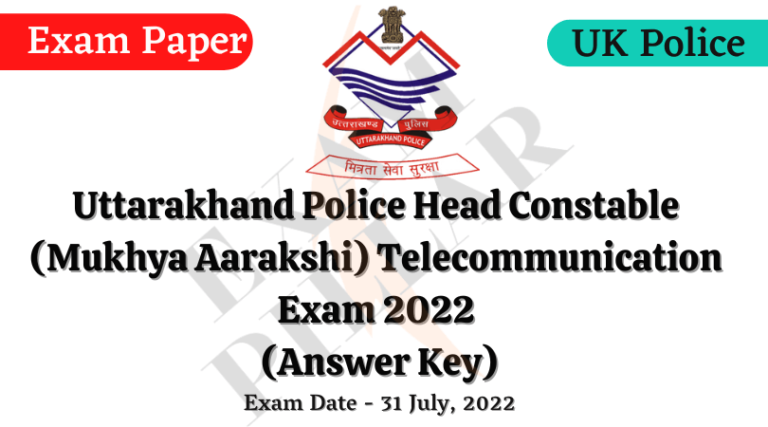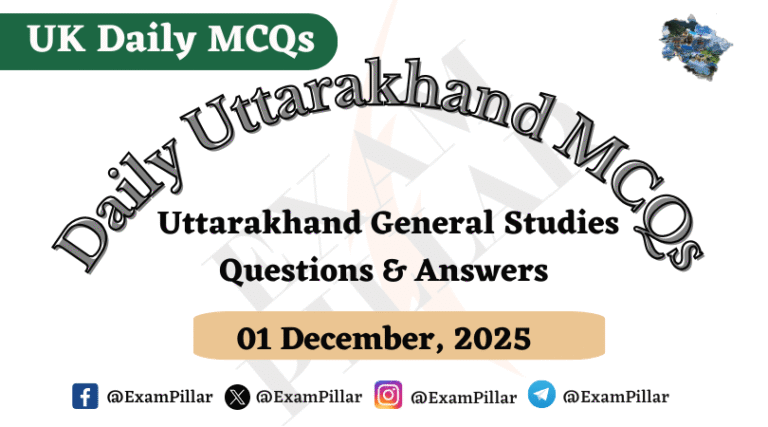CBSE conducted the CTET (Central Teacher Eligibility Test) Exam Paper 2021-22. This Paper held on 22 December, 2021. Here The CTET Paper – I, Part – I (Child Development and Pedagogy) in English Language Solved Question Paper. CTET December, 2021 Question Paper with Answer Key.
CTET (Central Teachers Eligibility Test)
Paper – I Primary Level (Class 1 to Class 5)
Exam – CTET Paper I Primary Level (Class I to V)
Part – Part – I (Child Development and Pedagogy)
Organized – CBSE
Number of Question – 30
Exam Date – 22 December, 2021
CTET Exam December 2021 Paper – I (Primary Level)
Part – I Child Development and Pedagogy
(Official Answer Key)
1. Which domain of development relates to intellectual abilities such as attention, memory, problem solving, imagination and creativity?
1. Emotional domain
2. Cognitive domain
3. Social domain
4. Physical domain
Click To Show Answer/Hide
2. Sana learnt to hold a glass and a bottle before she could hold a pen or button her shirt. This example indicates that –
1. Development is unidimensional.
2. Direction of development is cephalo -caudal.
3. Direction of development is proximo – distal.
4. Direction follows a random pattern.
Click To Show Answer/Hide
3. Development of children is a result of –
1. only heredity.
2. only environment.
3. schooling and education.
4. interaction between heredity and environment.
Click To Show Answer/Hide
4. Which of these is NOT a primary agent of socialization ?
1. Family
2. Neighbourhood
3. Peers
4. Government
Click To Show Answer/Hide
5. On the basis if children’s responses to Heinz dilemma, Lawrence Kohlberg has proposed specific developmental stages of –
1. Moral Development
2. Social Development
3. Psychological Development
4. Personal Development
Click To Show Answer/Hide
6. 9 year old Leela classifies a collection of buttons according to their size. She then combines all groups of buttons and re-distributes them on the basis of holes on them. According to Jean Piaget’s theory of cognitive development, Leela is in ____________ stage of development.
1. Pre -operational
2. Formal -operational
3. Concrete -Operational
4. Sensori -Motor
Click To Show Answer/Hide
7. _______ occurs when children transform their experiences to fit into their existing schemes.
1. Assimilation
2. Accommodation
3. Centration
4. Conservation
Click To Show Answer/Hide
8. Lab Vygotsky’s theory of cognitive development is called a _____________ theory as he argues that children’s learning takes place in a context.
1. psycho -dynamic
2. psychosexual
3. social -cultural
4. behaviouristic
Click To Show Answer/Hide
9. When a teacher adjusts the support offered to a child to fit the child’s current level of performance and to help her reach her zone of proximal development, the teacher is –
1. using co-operative learning.
2. demonstrating inter -subjectivity.
3. scaffolding the child.
4. inducing cognitive conflict in the child.
Click To Show Answer/Hide
10. In a progressive classroom –
1. teaching is textbook -centric.
2. emphasis is placed on summative assessment.
3. learners play an active part in their learning.
4. teachers uses rewards and punishment to direct children’s learning.
Click To Show Answer/Hide
11. _______ intelligence refers to the ability to recognize and respond appropriate to the moods, temperaments and intentions of others.
1. Interpersonal
2. Intrapersonal
3. Spatial
4. Logics -mathematical
Click To Show Answer/Hide
12. National Education Policy 2020 proposes that –
1. children in primary grades should be taught in home / local languages.
2. there should be one uniform language of instruction in primary classes.
3. teachers should be discouraged to use a bilingual approach.
4. multilingualism should be heavily discouraged.
Click To Show Answer/Hide
13. A School gives preference to boys while selecting students for Badminton competition and to girls for music competitions. This indicates –
1. Gender stability
2. Gender identity
3. Gender equality
4. Gender stereo typing
Click To Show Answer/Hide
14. Continuous and comprehensive evaluation entails which of these –
i) planning on parameters and tools of evaluation
ii) meticulous record keeping by the teacher
iii) periodic testing and ranking of children
iv) integration with the teaching -learning process
Options :
1. I, ii, iv
2. ii, iv
3. I, ii, iii
4. ii, iii
Click To Show Answer/Hide
15. What should be the underlying principal for assessment according to National Education Policy 2020?
1. Primarily testing rote memorisation skills
2. Encouraging learning of content only
3. Optimizing learning and development for all students
4. Assessing students only into the cognitive domains through end of the year examination
Click To Show Answer/Hide





Leave a Reply